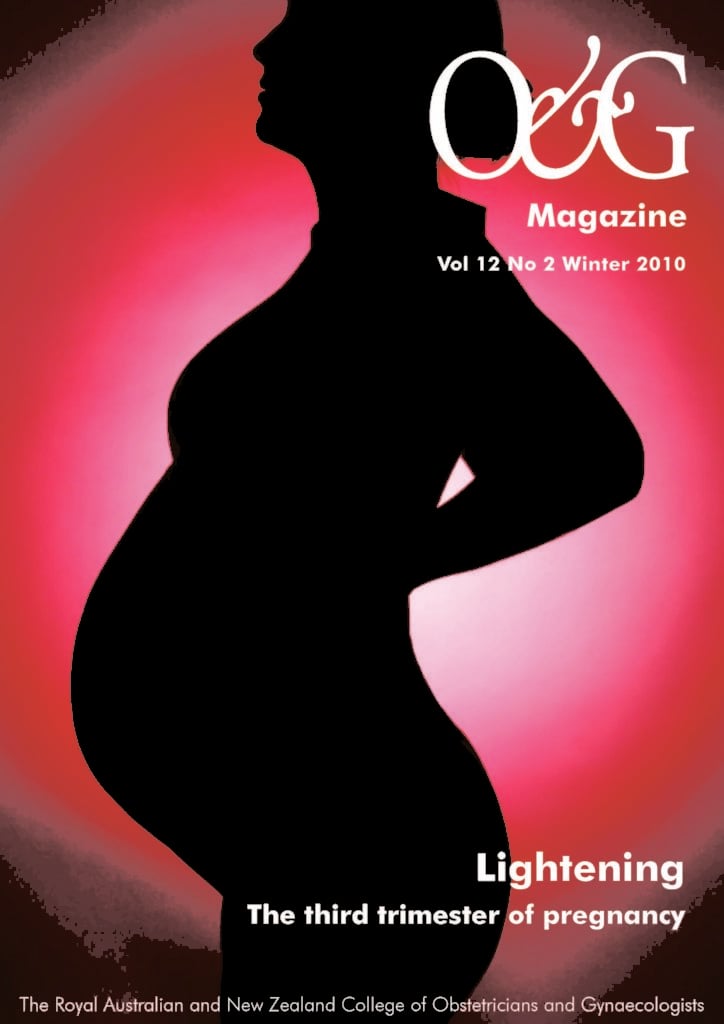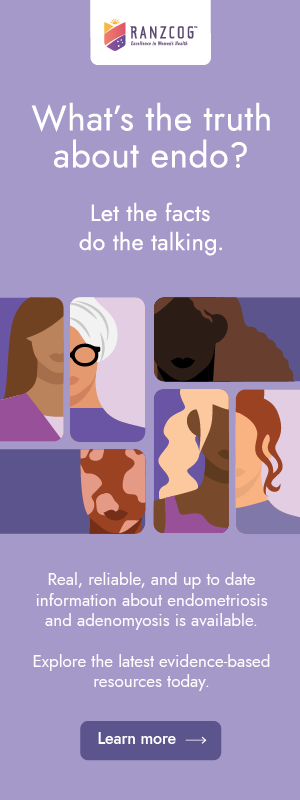Being involved in the care of younger, teenage women provokes a mixed response from clinicians, but one that is often mingled with some anxiety.
I suspect this partly reflects their own (embarrassing) recollections of being a teenager; thinking of the hassles of communicating with their own teenage children; knowing that teenagers don’t always give you a straight answer; wondering whether you will need to ask the parent to leave the consultation; wondering whether you have the time for what will almost invariably be a longer than normal consult; and finally, that there may be medico-legal issues around decision-making, consent, confidentiality and mandatory reporting that may impact on the consultation. Medico-legal issues always seem to have the effect of raising ones anxiety – not a good place to start a consultation.
As teenagers are often accompanied by an adult, it is worth ensuring that you immediately establish that the consultation is primarily with the young person – get the young person to introduce you to their accompanying adult or parent. If you actually know the mother already (possibly as she is a patient of yours), try to ensure that you are making the adolescent or young girl the focus of the consultation. In the first few minutes, it is also worth mentioning to the adult that it is usual practice to do some of the consultation with an adolescent without the adult or parent in the room. I often say to the accompanying adult that it is good practice for the young person to do some of this on their own, as having a medical consultation is a new experience. A young person will often talk to me more easily without another adult in the room.
So why is this important medico-legally? I am not aware of anyone being sued because they didn’t ask a parent to leave the room and hence failed to uncover a critical piece of information, but on the other hand, it is our obligation to provide care to the highest possible standards. Failing to ask a question regarding sexual activity (because we didn’t want to ask in front of the mother, or asked and got the wrong answer because the mother was there), hence missing the chance to do a screening test for chlamydia in this higher risk population (under 25 years old and sexually active)1 could in theory leave us responsible for the subsequent pelvic inflammatory disease and tubal obstruction.
Teenagers do need to know that the consultation is confidential2,3 with the following exceptions – the young person is at risk from self-harm, is about to harm someone else, or is being harmed (therefore mandatory reporting). In these circumstances, adolescents will usually give consent for breaking confidentiality, if you take the time to explain why it is necessary, although there can be rare occasions where you need to break confidentiality without their consent. There is very clear evidence that teenagers who have been informed that the consultation is confidential provide a more complete and accurate history.2 We know that teenagers actually don’t mind about the gender or age of their doctor. What matters is the confidentiality and that the doctor is nonjudgemental.4
As an example, a 15-year-old is brought to see you with irregular and painful periods, accompanied by her mother. You have a preliminary discussion, with your questions and body language directing all your attention to the young woman – about home, school and other activities. You then discuss her period problems. (It is often helpful having the mother present, as she will have recorded the dates of the menses and may tell you the number of days of missed school). Then ask the mother to leave. Explain the confidentiality rules. Go back over some of the home, school, activity and friendship-related activities, working from less threatening topics, to the more sensitive ones around sexual activity.5 Is she missing school because of period-related problems or are there other issues behind this? Do her friends smoke? Do her friends have partners? Ask these questions before you ask if she smokes or has a partner. Having uncovered that she has been sexually active for the last eight months, that her mother does not know and that she does not want her mother to know, you are faced with wanting to do some further tests and wanting to ensure that she has adequate contraception (or your next consult may well be for the unplanned pregnancy, which will be more difficult than sorting out contraception).
You now have to determine whether the young woman is able to consent for contraception use (therefore, is she ‘Gillick competent’)6 and what the mother will be told. You also need to organise to test for chlamydia. You may well take the opportunity to say that you suspect that her mother may not be so upset and that most parents would prefer to know that their daughters were being sensible and using contraception rather than risk getting pregnant, but if she feels that at this point, she does not want her mother to know, then the confidentiality requirements and your medico-legal obligation is to not break that.
To decide if the teenager is Gillick competent is to decide that she fully understands the treatment proposed. In fact, at the time of the ruling in 1985, one of the judges established guidelines on prescribing contraception to an under 16-year-old (Fraser Guidelines).6,7 The UK ruling has been confirmed in Australia. In New Zealand, this has not occurred, but legal opinion suggests that the same principles would also apply given the widespread clinical usage of them.8
To fulfill the Fraser Guidelines you will need to:
- Discuss with the young person the benefits of talking the issue over with her parents.
- Establish that the young person can understand the relevant information which means understanding the causal relationships (in this case, between sex, pregnancy and STIs, and the role of contraception and safe sex). To assess this you will need to ask her to explain back to you the information you have discussed.
- Believe that the young person will be having sex with or without contraception.
- Believe that the physical or mental health of the young person will suffer if the request is denied.
- Believe that it is in the young person’s best interests to prescribe contraception and to respect her confidentiality.
With this 15-year-old, your assessment is that she does understand the need for contraception, the risks of using the pill and understands how to use it. She does not feel able to discuss this with her mother at the moment, but will think about it. You carefully document your discussion. You organise a urine PCR test for chlamydia and sort out how you will communicate these results without breaking her confidentiality. You agree that you will not tell her mother and that when her mother returns into the room you will say that you have had a discussion regarding options to control the irregular and painful menses and have opted to use the oral contraceptive pill, as this will tackle both the irregular and the painful period problems.
Assessing Gillick competence7 is about trying to ensure that the young person understands the risks and complications of a proposed medical treatment. The detail and extent you go to is directly proportionate to the riskiness and complexity of the issue. So Gillick competence for contraception would require less time, information and documentation than consent for a pregnancy termination.
If you undertake a clinical examination, then consenting for this also requires you to explain to her what you would like to do. As a 15-year-old, she has probably never had a genital examination before. She may feel more comfortable if you explain her anatomy to her whilst she holds a hand mirror. If you think an ultrasound is required, make sure that she is aware that this can be a transvaginal procedure, but that this is likely to be appropriate only if she is sexually active and is comfortable with it.9 Examinations without consent can be considered assault.
Mandatory reporting is another issue in the care of younger patients. This is relatively straightforward if you uncover a story of abuse or discover examination findings that are suggestive of abuse. Referral to a centre for assessment for child abuse should be made and clarify with that team whether you should report to the relevant authority or whether they will. Although the legislation does vary10, in all cases, doctors are obliged to report where abuse is suspected. Some areas of potential difficulty exist. If you are seeing a 14-year-old who is sexually active or pregnant with an 18-year-old boyfriend, are you obliged to report? It may be technically illegal, but you are not mandated to report if this is a consenting and equal relationship. If she is a 14 or 15-year-old with a 30-year-old partner, there would have to be serious concerns about whether she is being taken advantage of and thus you would want to ring the relevant department to seek advice. Likewise, a 16-year-old young woman with a mild to moderate intellectual disability, who is in a consenting relationship with a 16-year-old boy, with an equal level of intellectual disability is probably fine. However, the same girl in a relationship with an older male who is not intellectually disabled is likely to represent abuse and hence require reporting.
Yes, your consultation did take longer, but having done a careful consultation, you have avoided potential medico-legal problems and you have hopefully given the teenager a positive experience in terms of managing her reproductive health, contributing to her sense of self-respect and autonomy.
References
- Department of Health and Ageing, Australian Government. National Notifiable Diseases Surveillance System. (Accessed at: www9.health. gov.au/cda/Source/Rpt_5.cfm accessed 30/3/2010).
- Ford CA, Millstein SG, Halpern-Felsher BL, Irwin CEJr. Influence of physician confidentiality assurances on adolescents’ willingness to disclose information and seek future health care. A randomized controlled trial. JAMA. 1997;278(12):1029-34.
- Veit FC, Sanci LA, Coffey CM, Young DY, Bowes G. Barriers to effective primary health care for adolescents. Med J Aust. 1996;165(3):131-3.
- Farrant B, Watson PD. Health care delivery: perspectives of young people with chronic illness and their parents. J Paediatr Child Health. 2004 Apr;40(4):175-9.
- Cohen E, Mackenzie RG, Yates GL. HEADSS, a psychosocial risk assessment instrument: implications for designing effective intervention programs for runaway youth. J Adolesc Health. 1991;12(7):539-44.
- Gillick case. Gillick vs West Norfolk and Wisbech Area Health Authority (1985) AC 112.
- Wheeler R. Gillick or Fraser? A plea for consistency over competence in children. BMJ. 2006;332:807
- McLean K. Children and competence to consent: Gillick guiding medical treatment in New Zealand. (Accessed at: www.austlii.edu.au/nz/journals/VuWLRev/2000/31.html#fn1).
- Royal Australasian College of Physicians. Genital examinations in girls and young women: A clinical practice guideline. (Accessed at: www. ranzcog.edu.au/publications/endorsedstatements/RACP_Paediatric_ Policy_Vaginal_examinations.pdf).
- Australian Institute of Family Studies. Mandatory reporting of child abuse. ISSN 1448-9112 (Access at: www.aifs.gov.au/nch/pubs/sheets/rs3/rs3.html).






Leave a Reply